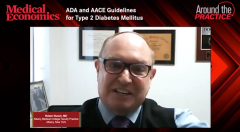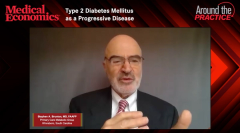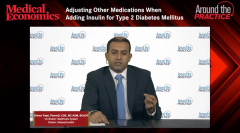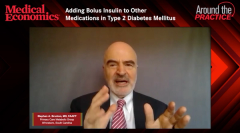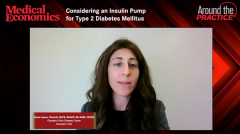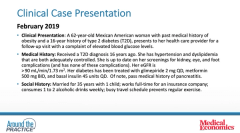
Type 2 Diabetes Mellitus as a progressive disease
Episodes in this series

Dhiren Patel, PharmD, CDE, BC-ADM, BCACP: Let me ask you a question. What I’m hearing, and hopefully this is the case, is that we’re going to get to using drugs that have what I call pleiotropic effects. We’re seeing that with the GLP class and the SGLT2 class, and there may be less emphasis on some of the ones that don’t have a compelling indication. We talked about DPP4 inhibitors and SUs [sulfonylureas].
With what we described earlier, with diabetes being a progressive disease, is whether insulin is unavoidable for patients with type 2 diabetes. I’d love everyone’s perspective on that.
Stephen A. Brunton, MD, FAAFP: Let me get at it from private care. We see patients early, and it’s appropriate to talk about insulin very early on in the encounter. In the past, insulin has been used as a punishment. If we talk about the progressive decrease that’s occurring in the beta cell, we think it’s 50% to 80% of the beta cells basically, so it’s become a fact that they lost their function by the time diabetes is diagnosed, and it continues to decrease. When I used to work with residents, they would say “The patient is not compliant.” No, the pancreas is not compliant.
Dhiren Patel, PharmD, CDE, BC-ADM, BCACP: That’s right.
Stephen A. Brunton, MD, FAAFP: In fact, what you’re seeing is a natural evolution. There’s a significant percentage of patients who, if they live long enough, may end up on insulin. We’ve changed in primary care. We used to not use insulin because it was too complicated. Now it’s not complicated, and we’re treating them much more so. Bob, I know you’re experienced with it.
Robert Busch, MD: Yes. We get patients later in the illness needing insulin, but as Diana said, a lot of these patients are on insulin early on because primary care is comfortable with insulin now that we can titrate basal insulin pretty easily to fasting sugar levels. We sometimes add in the newer drugs like a GLP or SGLT2 if they could be afforded, and we could take off or get rid of insulin in many patients with type 2 diabetes. Believe me, we’re the ones getting the hugs; there’s no reason for that. Primary care should get the hug. If you have someone on the GLP and SGLT2, and they lose weight, come off insulin, and don’t have to use finger sticks anymore, they are the happiest people around. This is all primary care: You have the same drugs we have and the same standards of care. As long as there’s access to the drug and knowledge about the drugs and what else they have.
Diana Isaacs, PharmD, BCPS, BCACP, BC-ADM, CDCES: Yes, and I want to add that we know diabetes is progressive. Is insulin inevitable for everyone? No. Everyone is on their own journey. Some people develop diabetes later in life. Some people make huge lifestyle changes and end up not even needing any medication. Everyone’s journey is a bit different. With the obesity epidemic and with people developing diabetes earlier in life, many more people now are using and requiring insulin. I totally agree that we should never use insulin as a threat. It’s not a bad thing: It is part of the natural progression of diabetes, and that is OK.
Stephen A. Brunton, MD, FAAFP: I tell people that it’s a normal hormone. Your body produces it; we just replace what your body produces. It’s not a drug; it’s replacing your own body’s process.
Dhiren Patel, PharmD, CDE, BC-ADM, BCACP: I was just going to say that. It’s a comment that I’ve heard from many of you on the panel. At the end of the day, I’ll sometimes boil it down to the patient saying, “The internal supply of insulin is inadequate, and I need you to help me out and administer an external supply of it,” and it clicks sometimes.
Thank you all for your perspectives on that.
Newsletter
Stay informed and empowered with Medical Economics enewsletter, delivering expert insights, financial strategies, practice management tips and technology trends — tailored for today’s physicians.


